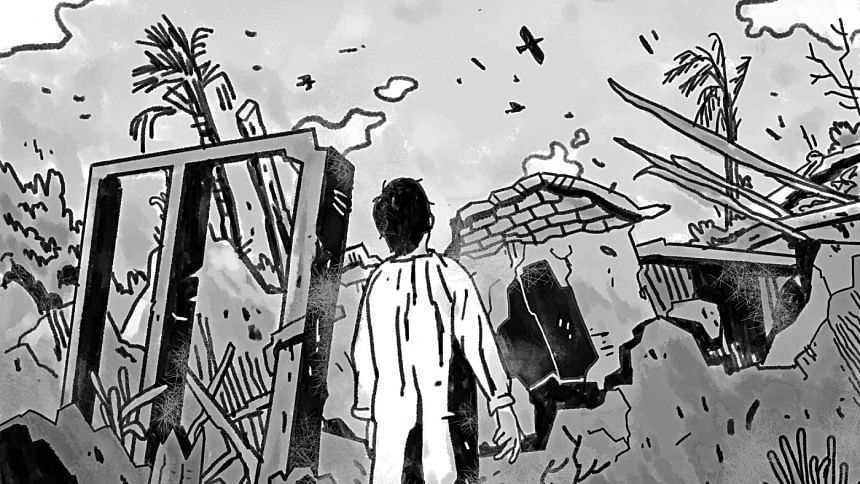Wasteland’s Symphony

1.
"I have an idea," I came soaring into the living room, which looked desolate with the sofa and the tables gone. "We can rent out our house and then we won't have to move." I announced proudly; if I could pat my own back for my incredible ingenuity, I would.
"But sweetheart," my mother smiled and looked up from her precious pots and pans she was stuffing in a box, "it is going to be our own home."
I left for the veranda and stared at the railing clothed in my blue pea vine. It couldn't be salvaged for it was all tangled up and settled, I was told. The magnificent ultramarine flowers blurred and disappeared in a sea of green.
"Hey," my father put a hand on my shoulder, "you will make new friends there. And we will have a huge garden in front of the house, alright? With all the varieties of pea flowers we can find." I nodded, and a teardrop landed on my left foot, my eyes filled up immediately after. My father sighed.
"There is also a bird next door," he said after a brief pause, glancing at me to detect any change in my mood. "It can talk," he continued in a sing-song voice. "Birds can't talk." I grumbled. "But this one sure can," my father grinned and pulled me up on his shoulders.
2.
"You can get closer, but don't touch the bars," Tahmeena warned me, "he pecks." I progressed carefully. Tahmeena lifted the cloth off the cage and revealed a Myna bird with a yellow collar. It squinted at me, I squinted back.
In the next few days, as we settled into our new home, I acquainted myself more with our new neighbours – to play board games with Tahmeena, to chase their pet chickens or be chased by their pet geese, to sit and stare at the Myna pacing inside the cage like an eighty year old. I'd started to familiarise myself with the distinct aroma of their cooking, the unknown language they used to talk to each other in, which, I was later told, was Urdu. The bird, however, wasn't taught Urdu, or he was modest enough not to make me uncomfortable. "Kemon acho?" was the only sentence he'd repeat. The bird would whistle out a high-pitched tune frequently, which I'd return from my home, and that was how we communicated, but when I whistled in front of his cage, he grew restless and jumped around but didn't reply. Perhaps he wanted to believe another bird with the same fate was calling out to him from afar. Maybe that's what kept him going.
3.
It was the year 1971.
Changes came in small sparks here and there. My school closed down. My mother wrote letter after letter to my brother for him to come back home, I wrote one asking him to bring me a bird.
I wasn't allowed to go to our front door neighbour's anymore, nor were they visiting us. The bird, however, kept on calling, and I'd return the calls. Two weeks later, on an evening in March, my brother did come home. He didn't bring me my bird; he didn't bring anything at all. The grownups in the house had a meeting and soon after we were packing up again. Only this time, we didn't know where we were headed.
On the day of our departure, we realised that most of the neighbourhood had already left in secrecy or were planning to do so. When I asked my mother why our front door neighbours weren't leaving, she told me offhandedly that they didn't need to. But she still went to check up on them and she returned surprised.
"Firoz told me they're leaving too." She told my father. "Where to, West Pakistan?" My father spat in disgust. "No, close to the border. They said that they consider this their country and their loyalty stands here." She declared. "That's what they all say," my father muttered.
4.
"Nazma, come inside, it's about to rain."
"Come on," Nazma pulls my sleeve; I follow her inside the house, dragging the heap of fodder we collected behind me. It had been a few months of us living in India. We stayed at a school at first, which was definitely not meant to accommodate over a thousand people. My father befriended some locals, and when the refugee camps were inaugurated, a man named Ishak offered to take us in and even gave us a room. My father now helped him run his small grocery shop.
We had grown accustomed to the abnormality of the situation swiftly. My father, originally an engineer, weighted rice in a tin room, my mother sewed kanthas for children she didn't know, and my brother somehow got lice. At the end of each day, as all four of us fell asleep in the cramped, windowless room, we couldn't remember ever having a house with a garden in this very realm.
All the upsetting news we received, we learned to toss with the stones that skipped seven times across the water before sinking into oblivion.
5.
The days were going by in a daze, until one day, with the icy breeze came the news that the war was coming to an end, we were just about to win, and we could finally go back home. A month passed and one crisp morning in January, we took our leave from the kind, hospitable people and left to find our home.
We couldn't. There was no home anymore, only mile after mile of debris. Some freshly installed shabby settlements were sticking out like sore thumbs. Some of our old neighbours were there, many weren't; some were people who had decided to stay. Within a few days, we too had a makeshift tent of our own. I laid in bed and gazed at the ruins in front of me.
"Can't sleep?" my brother asked softly.
"No it's just that –" I closed my eyes. The weight of what had been lost came screaming suddenly and I grew ten years older that instant. The Shangri-La I built in my head broke down.
"Do you think the Myna survived?" I asked.
"I don't know." He said after a small pause.
I whistled out to the caged bird with clipped wings that hopped around even in its compact enclosure. The wind joined the shrill, haunting tune and it resonated across the lifeless prairie.
No one answered.
Upoma Aziz is now a slouching, crouching, grouchy diffused bomb that is too tired to go off. Reach her at fb.com/upoma.aziz

 For all latest news, follow The Daily Star's Google News channel.
For all latest news, follow The Daily Star's Google News channel. 



Comments